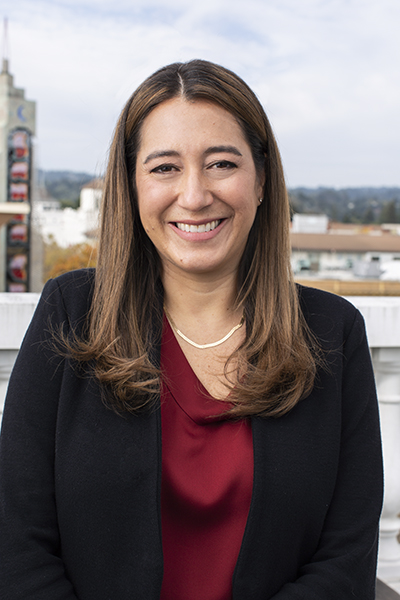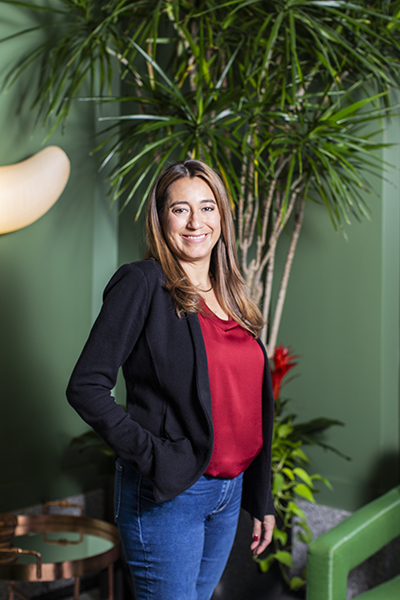|
Getting your Trinity Audio player ready...
|
“In one moment, I can be the go-to leader in a transaction as large as Google’s acquisition of Looker. In the next, I’m driving the carpool to my daughters’ volleyball game.” That somewhat summarizes the life of Tricia Timm, a working mother who is general counsel and executive sponsor of diversity, equity, and inclusion (DEI) at the Silicon Valley data-platform company Looker.
It also provides a hint at what she’s able to pull off as a Latina lawyer working in the male-dominated tech landscape that exists in and around Silicon Valley. Though she entered the vaunted industry somewhat at a disadvantage, you really wouldn’t know from interacting with her.
To be clear, Timm graduated cum laude from the Santa Clara University School of Law in 1996, giving her just enough time to fall in love with a fast-paced internet industry right before trouble hit. After being hired as the first attorney for Homestead—just as the internet company was about to go public in the early 2000s—the dot-com bubble burst and it had to cancel its Form S-1. It was a tough loss for Timm, who had worked hard at creating the precursor to the IPO. “Many of our customers went bankrupt, and our business took a turn,” she says.
Still, it was a good experience for her personally. “Not only did I learn how to build a legal department from scratch but I learned that success is not a guarantee in the tech world,” she notes.

Timm’s can-do spirit is due in no small part to her upbringing. Her mother came from El Salvador and her father from Ecuador, and both arrived in the US with few advantages and even fewer resources. But they worked hard—mom became a bank branch manager, dad worked for the airline Mexicana de Aviación—hard enough to send their daughter to school and inspire her to become a lawyer.
“My grandfather was an attorney in El Salvador, so my mom encouraged me to be an attorney like him,” explains Timm. During law school, she snagged a summer internship in an internationallaw firm, where she discovered an affinity for intellectual property and high-tech law. After graduation, she joined a large corporate law firm before moving on to work for a pair of software companies during the dot-com era.
Later, after having children, Timm discovered the challenges of being a working mother. She decided to take a year off but soon discovered just how much she missed working. Soon thereafter, she founded GCAssist, an “outsourced legal department” which proved to be a great way for her to balance work and life responsibilities.
“I hired several attorneys to work for my business, and we grew,” Timm explains. “By the time I left, I was generating $1 million in annual gross revenues.” It’s a pretty impressive accomplishment for a “mommy track” job, especially given that businesses with revenue over $1 million make up only 1.7 percent of all women-owned enterprises.
Once her kids reached elementary school age, Timm returned to company life, this time at SugarCRM, a late-stage start-up software company. There, she built a legal department from scratch to handle domestic and foreign operations.
It bears noting that despite working at these companies,Timm has never considered herself a native to technology. “I do lots of reading to understand the technologies of my clients and employers,” she says, adding that her law school provided a high-tech certificate program in which she participated. Ultimately, when she moved to Looker in 2018—a young company that had only formed in 2012—it was in keeping with her career track.

As the first general counsel at Looker—reporting directly to the company’s CEO Frank Bien—Timm was again called upon to build a legal department. “I felt like all my previous jobs prepared me for Looker,” she says. “I knew exactly what was needed to prepare the company for either an IPO or an M&A exit.”
Indeed, that exit came in the form of the company’s acquisition by Google. But aside from the considerable responsibilities entailed in that transaction, Timm accomplished an awful lot more in establishing Looker’s Diversity, Equity, and Inclusion (DEI) program. She proposed its creation to Bien, who gave it an enthusiastic blessing. Two staff members have since been hired to run the program, with eight employee resource groups formed and trainings in unconscious biases givenon a regular basis.
Outside of Looker, Timm contributes to her community as a member of the advisory board of theKatharine & George Alexander Community Law Center. A part of Santa Clara University, the nonprofit not only serves the needs of low-income communities but also provides free legal services in the form of training for law students to be more conscious of social justice initiatives. Timm believes her commitment to the center inevitably feeds into her work at Looker.
Today, she describes the company as having “an incredible corporateculture,” one that has survived a tripling in size in just a few years. Her next big projects are completing the acquisition and integration with Google and securing a corporate board seat.
The latter goal is an especially necessary one for Timm, considering the lack of diversity on corporate boards. She explains that, currently, Latinas only hold 2 percent of the seats. Timm is looking to change that statistic. If history is any guide, she should be able to manage both of her projects quite well—and still fit in kids’ volleyball games along the way.
As a Silicon Valley lawyer, Tricia has significant experience counseling technology companies as they grow and expand across global markets. She also is devoted to increasing diversity and representation in the industry. Baker McKenzie applauds Tricia and Looker for their leadership in the tech sector.

